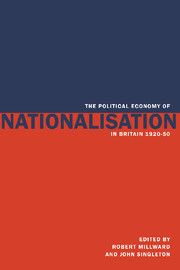Book contents
- Frontmatter
- Contents
- List of tables
- List of contributors
- Preface
- I Government and industry 1920–50
- II Case studies of industry organisation, performance and nationalisation
- 3 The coal industry: images and realities on the road to nationalisation
- 4 The changing role of government in British civil air transport 1919–49
- 5 The motor vehicle industry
- 6 The railway companies and the nationalisation issue 1920–50
- 7 The motives for gas nationalisation: practicality or ideology?
- 8 Public ownership and the British arms industry 1920–50
- 9 The water industry 1900–51: a failure of public policy?
- 10 Debating the nationalisation of the cotton industry, 1918–50
- III Government and the process of industrial change in the 1940s
- IV Review and Conclusions
- Index
4 - The changing role of government in British civil air transport 1919–49
Published online by Cambridge University Press: 07 May 2010
- Frontmatter
- Contents
- List of tables
- List of contributors
- Preface
- I Government and industry 1920–50
- II Case studies of industry organisation, performance and nationalisation
- 3 The coal industry: images and realities on the road to nationalisation
- 4 The changing role of government in British civil air transport 1919–49
- 5 The motor vehicle industry
- 6 The railway companies and the nationalisation issue 1920–50
- 7 The motives for gas nationalisation: practicality or ideology?
- 8 Public ownership and the British arms industry 1920–50
- 9 The water industry 1900–51: a failure of public policy?
- 10 Debating the nationalisation of the cotton industry, 1918–50
- III Government and the process of industrial change in the 1940s
- IV Review and Conclusions
- Index
Summary
The establishment of the British air corporations as state-owned enterprises in 1946 was probably the least controversial element in the nationalisation programme of the post-war Labour government. The British Overseas Airways Corporation had already been taken into public ownership in 1939, and civil aviation in Britain, as in most other parts of the world, had a history of government control and subsidy stretching back to the earliest commercial flights. Unlike the obvious targets for Labour's nationalisation plans, such as the coal industry, air transport had no ‘dues to pay’ to a large and exploited labour force, nor did it in any sense occupy a position on the commanding heights of the British economy. Hitherto the preserve of the privileged, with passengers, pilots and engineers coming mainly from middle-class backgrounds, there was little immediate expectation that it would become a popular means of transport and no reason to see its development as especially important to the government's plans for the future. That Labour found it necessary to nationalise Britain's airlines instead of leaving them as amenable private monopolies, as envisaged in the previous government's White Paper, seems to have been prompted by a mixture of economic pragmatism and ideological consistency.
Civil aviation was barely a quarter of a century old in 1945. While older industries and natural monopolies had been targeted for nationalisation at various times since the adoption of Clause 4 in Labour's 1918 constitution, air transport had hardly figured in the Party's deliberations. Moreover at the end of Labour's term of office in 1951 its economic significance was still only a fraction of that represented by the other major state-owned industries.
- Type
- Chapter
- Information
- Publisher: Cambridge University PressPrint publication year: 1995
- 2
- Cited by



